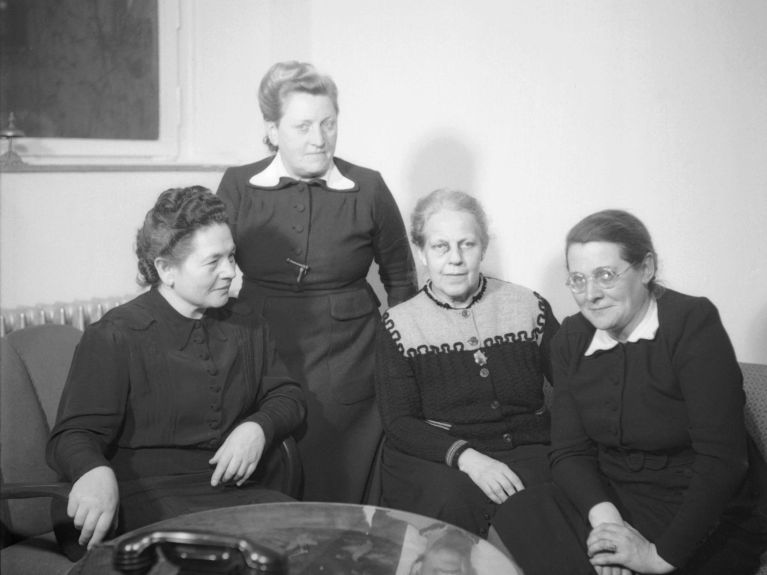The mothers of the Basic Law
Only four women helped draw up the Basic Law - but they achieved a great deal for equality in Germany.

There were only four female members of the Parliamentary Council that began drawing up the German Basic Law in 1948. This reflected attitudes at the time about the role of women, however. Despite the fact that women had taken care of their families during the Second World War and helped get the country back on its feet by clearing away the debris and rubble in the destroyed cities, the old distribution of roles was restored when the men returned. Women had to settle back into a patriarchal society in which they were not allowed either to open a bank account or to sign an employment contract, and in which the husband always had the final say on family matters.
Men and women shall have equal rights.
This made it all the more important that women pushed for one historic sentence to be included in the Basic Law, which was proclaimed on 23 May 1949: “Men and women shall have equal rights.” Without Dr Elisabeth Selbert (SPD), Friederike Nadig (SPD), Helene Weber (CDU) and Helene Wessel (Centre Party), this crucial passage would not have been included. That said, they had to fight hard for their cause. The four of them were surrounded by 61 men who felt that other issues were more relevant. According to the minutes of their meetings, they tended to respond with “amusement” to so-called women’s topics.
What is more, the four women did not even agree amongst themselves on the right way forward at first. The initiative came from the lawyer Elisabeth Selbert. First she persuaded her fellow SPD party member Friederike Nadig and later the other two women, who originally would have been happy to leave the Weimar Constitution wording in place: “Men and women have the same fundamental civil rights and duties.”
Selbert’s motion was rejected several times. She responded by initiating a public protest, which resulted in mountains of post arriving in Bonn, where the Council was convening. This was something even the men couldn’t ignore – and in the end the equality principle was unanimously adopted. Selbert later talked of this being a “moment of glory” in her life. She was without doubt the most combative of the four women, who came from different political camps but ultimately found a common denominator.
Elisabeth Selbert (1896 to 1986) – the campaigner
Born Martha Elisabeth Rohde, in her early twenties she married the Social Democrat and book printer Adam Selbert, who encouraged her to go back to school and obtain her Abitur - the university entrance qualification. The mother of two children, she graduated with a degree in law and wrote her doctoral thesis on the “irretrievable breakdown of marriage as a ground for divorce”. She subsequently opened a law firm in Kassel that kept her family afloat during the period of National Socialism. Later she was elected on behalf of the SPD, initially to the State Constitutional Assembly for Greater Hesse and then to the Parliamentary Council. Once her work there was finished, she sought a mandate for the German parliament, the Bundestag, but was unsuccessful. Instead, she was a member of the Hessian State Parliament until 1958 but then retired from politics and worked as a lawyer until an advanced age.
Friederike Nadig (1897 to 1970) – the implementer
“Frieda” Nadig was also a member of the SPD. She already joined the party in her early twenties. In Berlin she attended the Social Women’s School, where she qualified as a social worker. She was banned from her profession during the Nazi era. After the war she worked at the workers’ welfare association Arbeiterwohlfahrt and in 1947 was elected to the North Rhine-Westphalian State Parliament. From there she was elected to the Parliamentary Council. After some initial reticence, she was soon fighting shoulder to shoulder with Elisabeth Selbert for the article about equality. From 1949 to 1961 Nadig was a member of the Bundestag. She campaigned there for Article 3 of the Basic Law to be enshrined in further laws and implemented in practice.
Helene Weber (1881 to 1962) – the Catholic
She was born into a political family that supported the Centre Party. Weber soon became a member. She did a degree in Romance studies and economics and initially worked as a schoolmistress. A committed Catholic, she was forced into retirement by the Nazis but then worked in a charitable welfare organisation. After the war she was a member of the Bundestag representing the CDU until 1962.
Helene Wessel (1889 to 1969) – the troublemaker
Helene Wessel joined the Centre Party early on and was a member of the Prussian State Parliament from 1928 to 1933. Previously she had trained as a youth and social welfare worker. During the Nazi era the staunch Catholic worked in various positions within the Church. After the war she returned to politics and became deputy chairperson of the Centre Party in 1946. Though she supported the principle of equality after some initial hesitation, she was one of the twelve who ultimately refused to approve the new Basic Law. In her opinion, it lacked certain basic rights such as referendums. Later, Wessel was a member of the Bundestag, initially representing the Centre Party and from 1957 on behalf of the SPD.
The state promotes actual equality for women and men.
Paving the way for change
These four women not only went down in history, they also paved the way for further reforms. These include the Equal Rights Act (adopted in 1957), the reform of Marriage and Family Law (1976), the Act on Equal Treatment at the Workplace (1980) and the extension of Article 3 in the Basic Law. Since 1994, it has additionally read: “The state shall promote the actual implementation of equal rights for women and men and take steps to eliminate disadvantages that now exist.”
Equality in law has been achieved, though work is still underway to implement equal rights in everyday life - the proportion of women in leadership positions in politics and business is still not on a par with that of men, for instance. In the Bundestag too, only 31 percent of members are currently women. However, the situation could well be even less favourable if the goal of equality were not enshrined in the Basic Law. The continuous process of change is thanks in any case to four brave women who fought for their rights.


